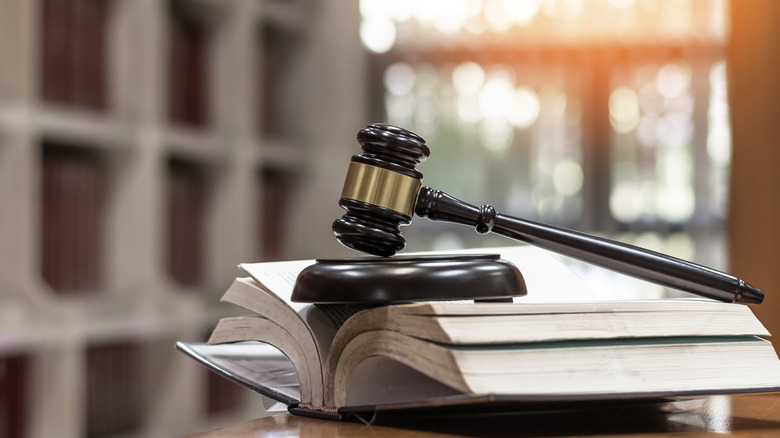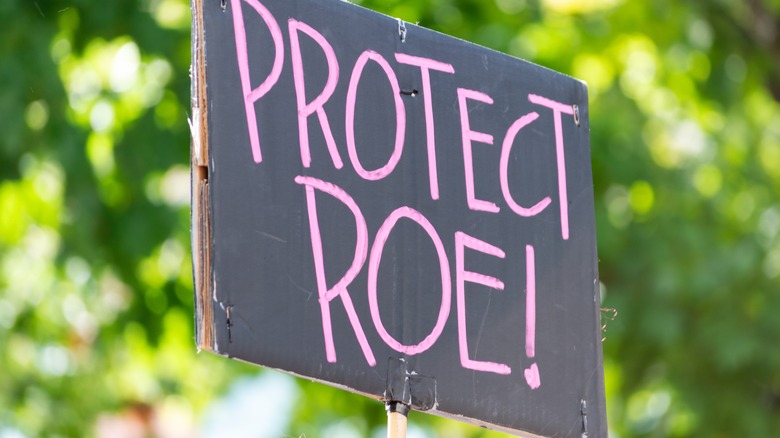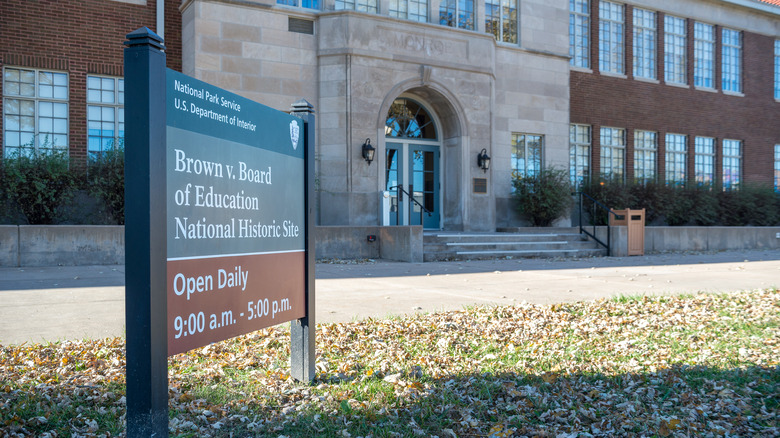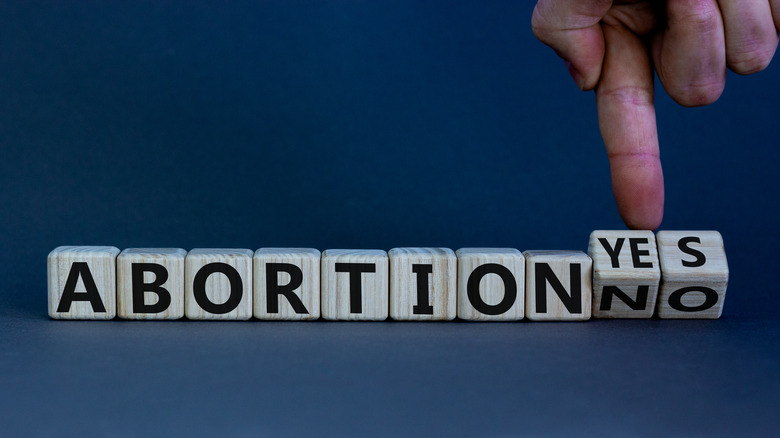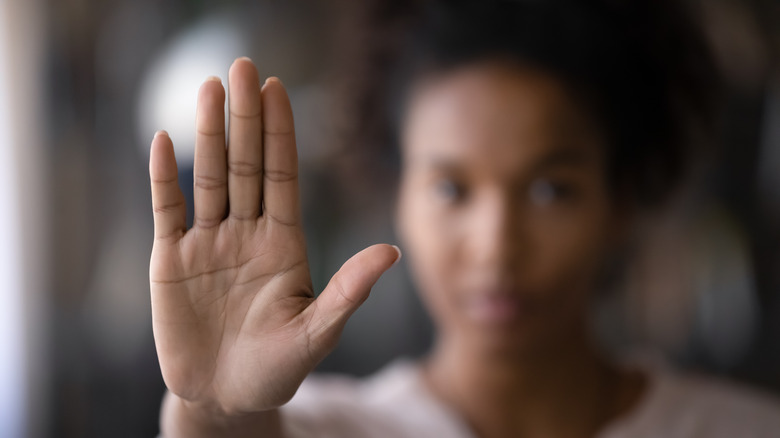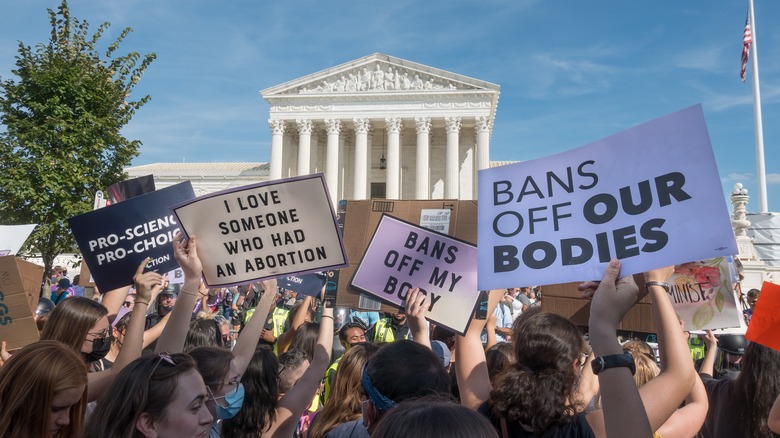What It Would Really Mean If Roe V. Wade Is Overturned
On May 2, 2022, Politico reported that it had acquired a leaked draft that implied that the U.S. Supreme Court is planning to overturn Roe v. Wade, a 1973 landmark case that made abortion a Constitutional right in the United States. As Al Jazeera points out, this does not mean that the Supreme Court has made a formal decision yet. However, it does bring into question the effects that this ruling would have on the country. Newsweek writes that the draft was reportedly made in February. In the 98-page document, Justice Samuel Alito states that "Roe was egregiously wrong from the start."
According to the BBC, an official ruling will most likely occur in June or early July. USA Today explains that activists knew that this possible reversal was imminent. Although drafts are considered strictly confidential, this leak has confirmed their worst fears, especially since Politico suggests that most justices are leaning towards overturning Roe v. Wade. That being said, the case is currently being challenged due to a law in Mississippi that prohibits abortions after 15 weeks of pregnancy (via NBC News). The Supreme Court was asked to rule on the law as it interferes with rulings in Roe v. Wade, as well as Planned Parenthood v. Casey.
The Roe v. Wade case
In 1970, The New York Times writes that a woman named Norma McCorvey wanted to have an abortion. At the time, she resided in Texas and was five months pregnant with her third child. Per Al Jazeera, McCorvey was prohibited from receiving an abortion as Texas law stated that pregnancy must be life-threatening in order to end it. She subsequently sued Henry Wade, the district attorney of Dallas County using the pseudonym Jane Roe (via Oyez). In her lawsuit, McCorvey claimed that her First, Fourth, Fifth, Ninth, and Fourteenth Amendments rights had been violated by Texas law.
According to the BBC, McCorvey later gave birth and in 1973, the case made it to the Supreme Court. In a 7-2 ruling, it was decided that abortion was a protected right under the U.S. Constitution after all (per Al Jazeera). Moreover, the justices affirmed that although abortion is not specifically named in the Constitution, it was still protected, specifically, under the Ninth and Fourteenth amendments. As The New York Times explains, Roe v. Wade also established a trimester system.
Simply put, a woman has the right to an abortion in the first three months of pregnancy with little government interference. In the second trimester, there may be some government regulation due to health concerns. In the last trimester, states can prohibit abortions, unless the pregnancy is life-threatening to the woman. Politico reports that in 1992 Planned Parenthood v. Casey reaffirmed that abortion was a Constitutional right.
The Supreme Court rarely overturns past decisions
Contrary to popular belief, the Supreme Court does have the power to overturn previous rulings. However, this rarely, if ever, occurs. In fact, Quartz reports that between 1946 and 2020, 9,095 Supreme Court decisions were made and only 161 of them, or 2%, were overturned. Per USA Today, this is because of "stare decisis," a Latin phrase that translates into "to stand by things decided." This principle is meant to ensure that the law remains consistent, even when the demographics of the justices change. Despite this, there is little to hold justices back to reevaluate previous rulings.
One notable case where this occurred was Brown v. Board of Education. In 1896, History writes that the Supreme Court ruled in Plessy v. Ferguson that "separate but equal" facilities were legal. This doctrine was famously overturned in 1954 when Brown v. Board of Education ruled that racially segregated schools were indeed unconstitutional. That being said, PBS reports that if Roe v. Wade is overturned, this can lead to the overruling of other civil liberties including LGBTQ rights.
As Alison Gash, a professor at the University of Oregon explains, "Literally the logic that allows for a woman to argue that she has a right to choose to have an abortion is the same logic that is used to argue that gay couples have the right to choose and marry the partner of their choice."
Every state would be free to make abortions illegal
What then, would happen if the Supreme Court does strike down Roe v. Wade? NPR writes that the decision would not make abortions illegal in the country outright. Nevertheless, it would give individual states the power to prohibit and control abortion. According to Axios, if Roe v. Wade is overruled, abortion would automatically become illegal in 13 states, including Oklahoma, Texas, and Mississippi. This is due to something called a "trigger law." CNN states that this is an abortion ban that was created to be enforced if Roe v. Wade is overturned.
Newsweek reports that it's believed that 24 to 26 other states would attempt to restrict or ban abortions soon after. However, there are 17 states that have implemented laws to keep abortion legal if Roe v. Wade is overturned (via Axios). This includes Washington, Oregon, and California, amongst others. Elizabeth Sepper, a professor at the University of Texas, expressed why the leaked draft is such a decisive moment in history.
Per USA Today, she explained: "The end of abortion access for many Americans is not hypothetical. A majority of the Supreme Court has cast their votes against a longstanding constitutional right to autonomy and self-determination."
This is who would be affected the most by decision
USA Today writes that overturning Roe v. Wade would be detrimental to people of color as statistically, they have higher abortion rates. For example, ABC News reports that minorities make up 40% of the population in Mississippi, but account for 80% of the women who are getting abortions in that state. Many are turning to abortion simply because they do not have the financial means to raise a child. Cathy Torres from the Frontera Fund, an organization that helps women pay for abortions, agrees with this sentiment and says that prohibiting or restricting abortions is "racist" because "They directly impact people of color, Black, brown, Indigenous people ... people who are trying to make ends meet."
ABC News explains this further by expressing that minorities have little access to both health care and birth control. Moreover, those with lesser means will be less likely to be able to travel to states that do offer abortions (via USA Today). Doctors have noted that this would surely increase illegal and secret abortions, which can lead to illness and death. However, overturning Roe v. Wade would undoubtedly affect all women. NPR states that one in four women in the U.S. will get an abortion and 40 million women reside in states that are combative towards abortion.
Abortion deserts and havens would be established
According to the Center for Reproductive Rights, if Roe v. Wade is overturned, this will inherently divide the country into two sections; abortion deserts and abortion havens. In other words, abortion deserts are states that will consider abortion illegal, while havens will continue to provide them for women. The BBC writes that would increase travel to states where abortion is not restricted or prohibited. Newsweek reports this is already currently occurring in Texas, where abortion laws are among the most stringent in the nation. The demand for travel to abortion havens will continue to increase if Roe v. Wade is overturned.
David Lane, a Denver-based attorney, likened this to the creation of a new "underground railroad" of sorts, per USA Today. The Pew Charitable Trusts states that several democratic states are considering enacting laws to ensure that women from abortion deserts are able to get low-cost abortion care as well as privacy so that they don't face legal trouble once they return home.
California is one state that has signed a bill that will reduce abortion costs. The plan is to expand and eventually allow others from abortion deserts to be able to reap these benefits. However, some argue that California is unprepared for the influx of people, especially when the state has few clinics throughout its landscape (via the San Fransisco Chronicle).
